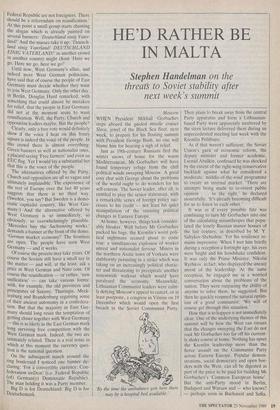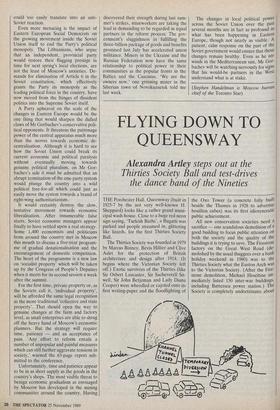HE'D RATHER BE IN MALTA
Stephen Handelman on the
threatS to Soviet stability after next week's summit
Moscow WHEN President Mikhail Gorbachev steps aboard the guided missile cruiser Slava, jewel of the Black Sea fleet, next week, to prepare for his floating summit with President George Bush, no one will blame him for heaving a sigh of relief.
Just as 19th-century Russians fled the winter snows of home for the warm Mediterranean, Mr Gorbachev will have found temporary refuge from the chill political winds sweeping Moscow. A good cosy chat with George about the problems of the world ought to do wonders for his self-esteem. The Soviet leader, after all, is entitled to play the senior statesman, with a remarkable series of foreign policy suc- cesses to his credit — not least his quiet manipulation of the stunning political changes in Eastern Europe.
At home, however, things look consider- ably bleaker. Well before Mr Gorbachev packed his bags, the Kremlin's worst poli- tical nightmare seemed about to come true: a simultaneous explosion of worker unrest and nationalist fervour. Miners in the northern Arctic town of Vorkuta were stubbornly persisting in a strike which was taking on an increasingly political charac- ter and threatening to precipitate another nationwide walkout which would have paralysed the economy. Meanwhile, Lithuanian Communist leaders were calm- ly defying Moscow's appeal to cancel, or at least postpone, a congress in Vilnius on 19 December which would open the first breach in the Soviet Communist Party.
'By the time the ambulance gets here there may be a hospital bed available.' Their plans to break away from the central Party apparatus and form a Lithuanian- based Party were apparently unaltered by the stern lecture delivered them during an unprecedented meeting last week with the Kremlin Politburo.
As if that weren't sufficient, the Soviet Union's guru of economic reform, the deputy minister and former academic, Leonid Abalkin, confessed he was shocked by the extent of the right-wing conservative backlash against what he considered a moderate, middle-of-the-road programme to create an internal market. 'There are attempts being made to re-orient public opinion . . . to the right,' he declared mournfully. 'It's already becoming difficult for us to listen to each other.'
It was as if every possible fate was combining to turn Mr Gorbachev into one of the calculating misanthropes that popu- lated the lonely Russian manor houses of the last century, as described by M. Y. Saltykov-Shchedrin. Yet his resilience re- mains impressive. When I met him briefly during a reception a fortnight ago, his eyes were bright and his handshake confident. It was only the Prime Minister, Nikolai Ryzhkov, in fact, who displayed the uneasy mood of the leadership, At the same reception, he engaged me in a worried conversation about the problems of the nation. They were outpacing the ability of anyone to solve them, he suggested. But then he quickly resumed the natural optim- ism of a good communist: 'We will of course get through this situation.' How that is to happen is not immediately clear. One of the underlying themes of this summit will be how the West can ensure that the changes sweeping the East do not rock Mr Gorbachev too far off his current- ly shaky course at home. Nothing has upset the Kremlin leadership more than the fierce assault on the Communist Party across Eastern Europe. Popular demon- strations, social democracy and open bor- ders with the West, can all be digested as part of the price to be paid for building Mr Gorbachev's 'Common European home'. But the anti-Party mood in Berlin, Budapest and Warsaw and — who knows? — perhaps soon in Bucharest and Sofia, could too easily translate into an anti- Soviet reaction.
Even more menacing is the impact of Eastern European Social Democrats on the growing movement inside the Soviet Union itself to end the Party's political monopoly. The Lithuanians, who argue that an independent, provincial party would restore their flagging prestige in time for next spring's local elections, are not the least of Moscow's anxieties. De- mands for elimination of Article 6 in the Soviet constitution, which effectively grants the Party its monopoly as the leading political force in the country, have now moved from the fringes of dissident politics into the Supreme Soviet itself.
A Party upheaval on the scale of the changes in Eastern Europe would be the one thing that would sharpen the dulled claws of Mr Gorbachev's conservative poli- tical opponents. It threatens the patronage power of the central apparatus much more than the moves towards economic de- centralisation. Although it is hard to see how the Soviet Union could break its current economic and political paralysis without eventually moving towards genuine political pluralism, on Mr Gor- bachev's side it must be admitted that an abrupt termination of the one-party system would plunge the country into a wild political free-for-all which could just as easily move the system towards a brand of right-wing authoritarianism.
It would certainly destroy the slow, tentative movement towards economic liberalisation. After innumerable false starts, Soviet economic managers appear finally to have settled upon a real strategy. Some 1,400 economists and politicians from around the country met in Moscow this month to discuss a five-year program- me of gradual denationalisation and the encouragement of domestic competition. The heart of the programme is a new law on 'socialist property' which will be taken up by the Congress of People's Deputies when it meets for its second session a week after the summit.
For the first time, private property or, as the Soviets call it, 'individual property', will be afforded the same legal recognition as the more traditional 'collective and state property'. That should open the way to genuine changes at the farm and factory level, as small enterprises are able to shrug off the heavy hand of Moscow's economic planners. But the strategy will require time, patience — and an acceptance of pain. 'Any effort to reform entails a number of unpopular and painful measures which can still further aggravate tensions in society,' warned the 63-page report sub- mitted to the conference.
Unfortunately, time and patience appear to be in as short supply as the goods in the country's shops. The most visible threat to benign economic gradualism as envisaged by Moscow has developed in the mining communities around the country. Having discovered their strength during last sum- mer's strikes, mineworkers are taking the lead in demanding to be regarded as equal partners in the reform process. The gov- ernment's sluggishness in fulfilling the three-billion package of goods and benefits promised last July has accelerated union militance. Miners in the Ukraine and the Russian Federation now have the same relationship to political power in their communities as the popular fronts in the Baltics and the Caucasus. 'We are the owners now,' one grinning miner in the Siberian town of Novokuznetsk told me last week. The changes in local political power across the Soviet Union over the past several months are in fact as profound as what has been happening in Eastern Europe, though not nearly as visible. A patient, calm response On the part of the Soviet government would ensure that those changes remain healthy. Even as he un- winds in the Mediterranean sun, Mr Gor- bachev will be watching nervously for signs that his would-be partners in the West understand what is at stake.
(Stephen Handelman is Moscow bureau chief of the Toronto Star)











































































 Previous page
Previous page